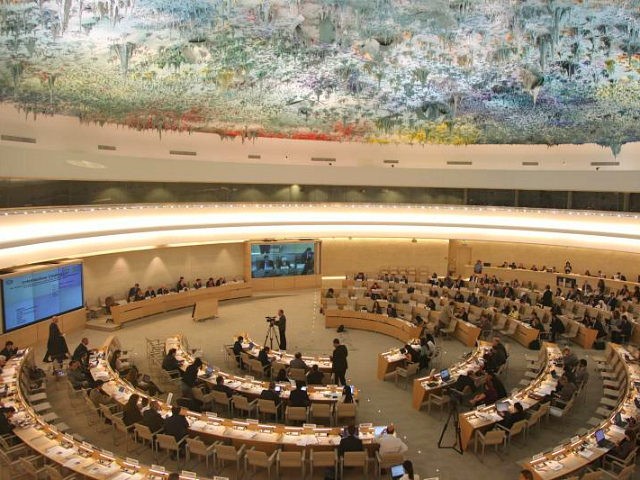Last week, U.S. Ambassador to the United Nations Nikki Haley attempted to have the U.N. Human Rights Council cease its perpetual preoccupation with condemning Israel. But our European allies would have none of it.
Europe refused to join the U.S. in seeking to terminate the Council’s permanent agenda item devoted to Israel –– the only country singled out in that fashion.
Nearly a year ago, Ambassador Haley warned the UN to reform the Human Rights Council or expect a U.S. exit from the body.
That moment might now be in the offing. If so, not a moment too soon.
The Human Rights Council was created in 2006 to supersede its corrupt predecessor, the UN Human Rights Commission, which at its end counted six of the most politically repressive regimes — Cuba, Saudi Arabia, Sudan, Libya, China and Vietnam — as members. Iran, a country known for “honor killings” of wives and daughters, led the commission’s women’s rights committee; Saddam Hussein’s representative once presided over its disarmament panel.
A satirist could scarcely conceive so perverse a record. But the Human Rights Council, which replaced the Human Rights Commission, has at the very least equaled it.
Under President George W. Bush, the U.S. refused to join the Human Rights Council, and for good reason. It is a human rights organization that actually cuts off human rights probes. In its first three years (2006-9), the Human Rights Council eliminated investigations into serious human-rights abuses in Belarus, Congo, Cuba, Liberia, and Sudan. In that time, some 200,000 people were killed and 2.5 million displaced in Darfur alone.
It was only under President Barack Obama that the U.S. joined the Human Rights Council for the stated purposes of promoting “universality, transparency and objectivity.” If such were the aims, American participation has been an abject failure, and was always likely to be. Thanks to the priority the council accords to representation based on geographical distribution, it has more autocracies than democracies. Thus, non-democratic African and Asian regimes exercise an unbreakable controlling majority of 26 of the 47 Council seats.
Tyranny, slaughter and repression being no barriers to membership, current members of the Human Rights Council include Afghanistan, China, Congo, Cuba, Egypt, Ethiopia, Qatar, Saudi Arabia, United Arab Emirates, and Venezuela –– all human rights abusers. None of these nations has ever been the subject of a single council resolution, let alone a special session.
In contrast, the council has passed 78 resolutions condemning Israel –– more than all other council resolutions combined.
The council’s public deference to human rights is purely cynical: of Sudan and its well-documented genocidal campaign in Darfur, it has only ever roused itself to express “deep concern.”
Indeed, the squalid dictatorships that dominate the council’s proceedings have acted in tandem to minimize scrutiny of nations like Zimbabwe, which collapsed further into tyranny on the Human Rights Council’s watch.
U.S. participation has done nothing to ameliorate this disgraceful record. It also did not stop the council from approving the membership of Iran, despite its record of public hangings of gays.
America’s presence on the Council did nothing to prevent the extraordinary bias of the Goldstone Report, which perverted international legal norms and procedures to find Israel guilty of war crimes in the 2009 Gaza war (and was later repudiated by its author). The U.S. presence on the council did nothing to forestall or ameliorate this demonization of a fellow democracy — or to prevent the U.N. General Assembly from endorsing it.
In short, U.S. membership of the Human Rights Council invests it with unwarranted credibility and prestige. American participation has not achieved the stated aim of moderating the council’s excesses or making it a responsible international human rights body.
While the Human Rights Council has no dispositive power, it does damage nonetheless. Consider the resolution it passed last month perversely condemning Israel as a human rights violator for defending itself against weeks-long, still-ongoing attacks on its border with Gaza, while saying nothing in its approximately 800-word-long draft about the Hamas terrorist organization that is orchestrating the assaults.
As usual, the autocracies voted to condemn Israel. Only the U.S. and and Australia, two of the small handful of democracies presently represented on the council, voted against the resolution, while the timorous Europeans chose abstention, resulting in a vote of 49 to 2, with 14 abstentions. This travesty of a resolution was then held up by vociferous critics of Israel as objective evidence of alleged Israeli criminality, as good reason to further condemn Israel, and as a warrant to initiate further political campaigns against her.
The Human Rights Council provides a halo effect for perverters of human rights and its own disreputable findings and publications. It legitimizes those who abuse human rights while defaming those who uphold them.
Accordingly, it would be better if free nations ceased to legitimize the Human Rights Council with their participation. In fact, they should withdraw without delay and and say why.
Morton A. Klein is National President of the Zionist Organization of America (ZOA). He was named one of the top five Jewish leaders in the U.S. by National Jewish weekly. Follow him @mortonaklein7 and ZOA.org.

COMMENTS
Please let us know if you're having issues with commenting.